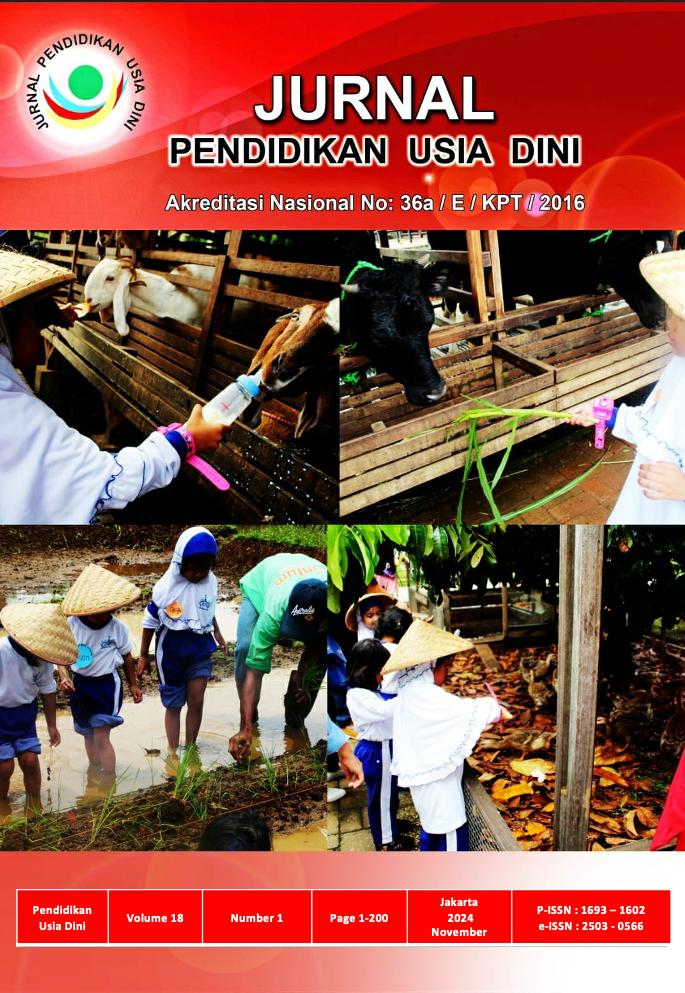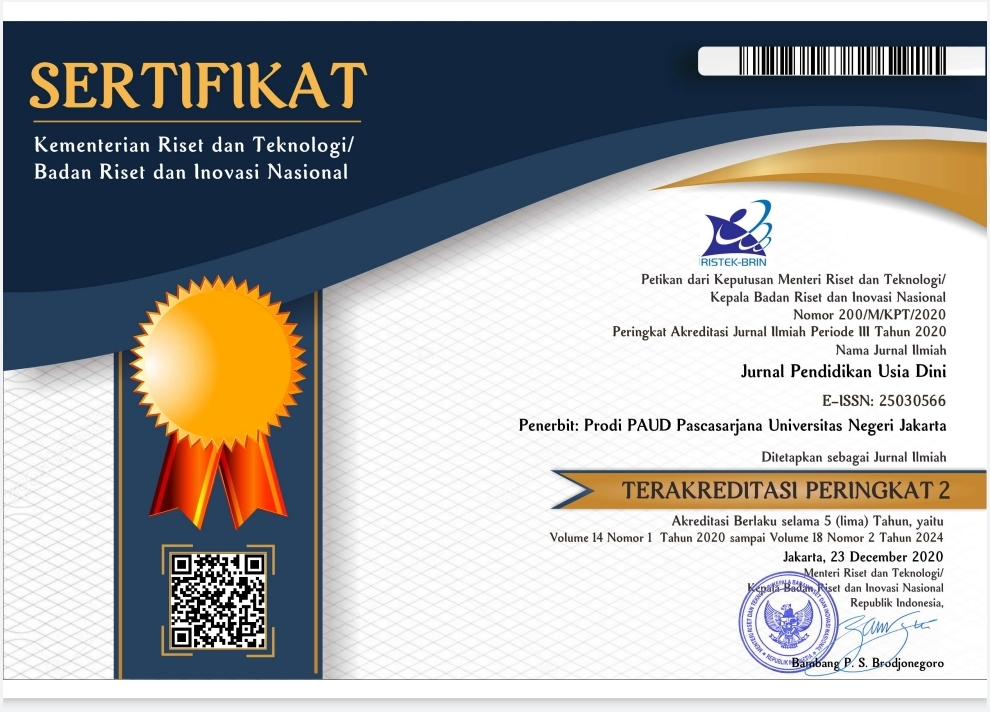Social Behavior Analysis Theory of Children in the Transition Period from Home to School: Studi Literature Review
DOI:
https://doi.org/10.21009/jpud.v18i2.47971Keywords:
Transitions, Social behavior, Parents, Early childhoodAbstract
This study aims to identify and analyze the social behavior of children during the transition from home to school environments. The study utilizes a literature review method encompassing the ELSEVIER, Sage Journals, ResearchGate, and Taylor & Francis databases. It examines various literature on children's social behavior during the transition period, the role of parents, and the role of teachers during the transition from home to school. The findings of this review are contextualized within the broader framework of early childhood social behavior. The research findings indicate that while a number of studies have investigated children's social behavior during the transition period, there is still a lack of comprehensive empirical understanding. This study highlights the need for further research that focuses on a comprehensive understanding of children's social behavior during this transition period to support optimal social and academic development in children. Furthermore, this study also emphasizes the importance of intervention strategies that can help children navigate environmental changes more effectively.
References
Abd Rahim, M. H., Ismail, M., Ibrahim, A., Ab Rahman, A., Yaacob, N. M., & Hashim, N. S. F. (2023). Emotional and behavioural problems among preschool children in Northeast Peninsular Malaysia: Parent report version: Healthcare. 11 (13), 1828; https://doi.org/10.3390/healthcare11131828
Adams, M dan Fleer, M. (2015). Displaced countries: Moving countries: Belongings as central for realizing the affective relation between international shifts and localized micro movements. Learning, Culture and Social Interaction. Volume 6, Pages 56-66. doi.org/10.1016/j.lcsi.2015.03.003.
Arslan, E. (2021). Investigation of Pre- School Children's Self-C oncept in term of Emotion Regulation Skill, Behavior and Emotional Status. anales de psicología/ annals of psychology, 37 (3), 508-515, https://doi.org/10.6018/analesps.364771
Baker, JK, Fenning, RM, & Crnic, KA (2011). Emotion Socialization by Mothers and Fathers: Coherence among Behaviors and Associations with Parent Attitudes and Children’s Social Competence. Institutes Health of National, 20 (2), 412–430. doi:10.1111/j.1467-9507.2010.00585.x.
Bariola, E., Gullone, E., & Hughes, Elizabeth, K. (2012). Relationships Between Parent and Child Emotion Regulation Strategy Use; A Brief Report: Journal of Child and Family Studies. 21 (3). DOI 10.1007/s10826-011-9497-5
Chen, F. (2015). Parents’ and children’s emotion regulation strategies in emotionally situated zones:A cultural- historical perspective. European Early Childhood Education Research Journal Vol. 40. Issue 2
Chen, F., & Fleer, M. (2016). A cultural-historical reading of how play is used in families as a tool for supporting children's emotional development in everyday life. European Early Childhood Education Research Journal Vol. 24 (2), (305-319). DOI: 10.1080/1350293X.2016.1143268
Fleer, M., & Hammer, M. (2013). “Perezhivanie” in Group Settings: A Cultural-Historical Reading of Emotion Regulation. Australasian Journal of Early Childhood, 38(3), 127–134. doi:10.1177/183693911303800316
Hedegaard, M., Fleer, M., Bang, J., Hviid, P. (2008). Examining child development – an introduction. In M. Hedegaard M. Fleer (Eds.), Studying children: Cultural-historical approaches (pp. 1–9). London: Press Open University
Hedegaard, M. (2012). Analysing children's learning and development in everyday settings from a cultural-historical wholeness approach. Mind, Culture, and Activity,19(2), 127 138. https://doi.org/10.1080/10749039.2012.665560.
Hedegaard, M. (2014). The significance of demands and motives across practices in children's learning and development: An analysis of learning in home and school. Learning, Culture and Social Interaction, 3, 188–194. https://doi.org/10.1016/j.lcsi.2014.02.008
Hedegaard, M dan Anne, E. (2014). Transitions and children's learning. Learning culture and social interaction. Vol. 3, No. 3. DOI: 10.1016/j.lcsi.2014.02.007
Jaga, M. R., Nelci, A., & Hornay, P. M. A. (2023). The social factors that influence children's interactions and behavior in classroom. Journal Children. MDPI. Vol.6;64. doi:10.3390/children6050064
Maleki, M., Chehrzad, M. M., Leyli, E. K., Mardani, A., & Vaismoradi, M. (2019). Social skills in preschool children from teachers’ perspectives. Children, MDPI. 6, 64; doi:10.3390/children6050064
Ma, J., Hammer, M., & Veresov, N. (2021). Cultural-historical study of crises in child role adjustment during transition to school within a bi-cultural context. Early Child Development and Care. 192:8, 1243-1256, DOI: 10.1080/03004430.2020.1865336
Maguire, L. K., Niens, U., McCann, M., & Connolly, P. (2016). Emotional development among early school-age children: gender differences in the role of problem behaviours. Educational Psychology, 36(8), 1408–1428. https://doi.org/10.1080/01443410.2015.1034090.
Major, S, d, O, Maria J,S,S & Roy P. M. (2020), Preschoolers’ Social Skills And Behaviour Problems At Home:Mothers And Fathers’ (Dis) Agreement, Early Child Development And Care. https://doi.org/10.1080/03004430.2020.1737039.
Obaki, S, O. (2017), Impact Of Classroom Environment On Children’s Social Behavior. International Journal Of Education And Practice, Vol 5, No, 1,Pages 1-7.
Utami, AD, M. Fleer, and Liang. Li, (2023), The Player role of the teacher in playworld creates new conditions for children’s learning and development, International Journal of Early Childhood. Vol 55, Issue 2, Pages 169-186
Rohayati, T, (2018) Pengembangan Perilaku Sosial anak Usia Dini, Cakrawala Dini Jurnal Pendidikan Anak Usia Dini, Vol 4, DOI: 10.17509/cd.v4i1.10377.
Sikder, S. (2015). Social situation of development: Parents' perspectives on infants-toddlers' concept formation in science. arly Child Development and Care, 185:10,1658-1677, DOI: 10.1080/03004430.2015.1018241
Sikder, S., & Fleer, M. (2018). The relations between ideal and real forms of small science: conscious collaboration among parents and infants–toddlers. Cultural Studies of Science Education. Vol 13, Pages 865-888. https://doi.org/10.1007/s11422-018-9869-x
Sumadi, T. Siska P, Rien Safrina. (2019). Peningkatan Kemampuan Sosial melalui Bermain Kartu Estafet pada Anak Usia Dini. Jurnal Obsesi : Jurnal Pendidikan Anak Usia Dini. Volume 3 Issue 2 (2019) Pages 440-447. DOI: 10.31004/obsesi.v3i2.222
Veresov, N. (2017). The Concept of Perezhivanie in Cultural-Historical Theory: Content and Contexts, Perspectives in Cultural-Historical Research. DOI:10.1007/978-981-10-4534-9_3.
Widyanoory, C, J dan Yuli K,S,P. (2019). The Influence of Personal Adjustment on Social Interactions in Children Aged 4-5 Years. early childhood education essay. Vol. 8, No.1, Pages 21-27. DOI: http://dx.doi.org/10.15294/belia.v8i1.29786
Downloads
Published
How to Cite
Issue
Section
License
Copyright (c) 2024 https://creativecommons.org/licenses/by/4.0/

This work is licensed under a Creative Commons Attribution 4.0 International License.
JURNAL PENDIDIKAN USIA DINI work is licensed under a Creative Commons Attribution 4.0 International License. (http://creativecommons.org/licenses/by/4.0/)





